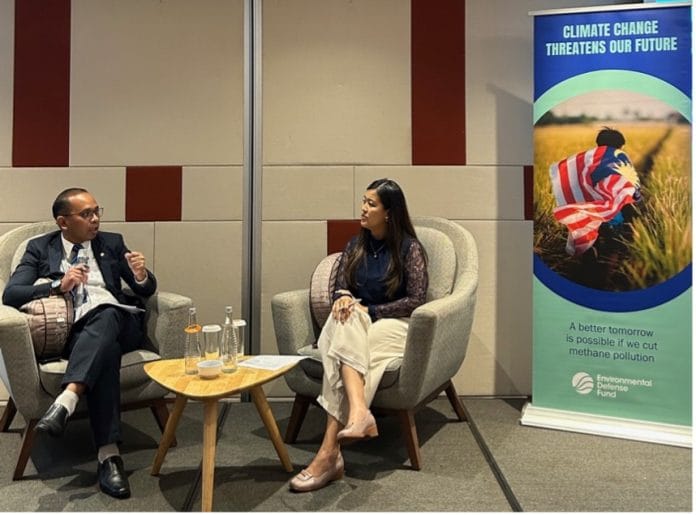
METHANE is a potent greenhouse gas (GHG), but unlike other GHGs, methane emissions can be used as energy, as it is the primary component of natural gas.
Currently, the oil and gas industry faces scrutiny due to its substantial methane emissions. According to the International Energy Agency (IEA), global methane emissions from the oil and gas sector reached 82 million metric tonnes in 2022. As methane is both colourless and odourless, leaks may go unnoticed without regular monitoring. However, intentional releases also occur through flaring and venting.
Dr Shareen Yawanarajah, director (energy transition) of EDF, said in her opening remarks: “Methane which is lost to the atmosphere is a lost commercial opportunity and waste of energy.”
She pointed out that methane has more than 80 times the warming power of carbon dioxide over the first 20 years after it reaches the atmosphere.
She said: “Although methane was overlooked during the climate change conversations for many years but it is now in the spotlight after the Global Methane Pledge was launched in COP 26 in Glasgow two years ago.”
For ASEAN countries to ride the energy transition wave and reduce methane emissions in oil and gas operations, the role of methane innovation needs to be addressed.
The US-based Environmental Defense Fund (EDF) posed this question during a hi-tea networking session for first-time masterclass participants for the Methane Leadership Programme (MLP).
ASEAN Methane Leadership caucus was launched by the former Minister of Natural Resources, Environment and Climate Change, Nik Nazmi Nik Ahmad, during Energy Asia 2023 to drive effective methane management programmes to support the Global Methane Pledge.
The networking session was organised parallel to the recently concluded Asia Pacific Climate Week 2023 . The session aimed to spark conversation on methane reduction and innovation opportunities for climate action among oil and gas industry stakeholders in the region. The session saw participants from regional key players including Petronas, Pertamina, Japan Organisation for Metals and Energy Security (JOGMEC), and the ASEAN Centre of Energy – whom are all partners to the MLP.
Seizing the Methane Innovation Opportunity
Engaging in methane action presents a dual advantage, benefiting both the climate and economic opportunities. However, the extent of a country’s gains depends on the innovative aspects involved. According to the International Energy Agency (IEA), approximately 70% of methane emissions from global fossil fuel operations could be curtailed using existing, well-established technologies.
To look into how countries from the ASEAN region can seize this opportunity, Emily Oi, Asia Pacific consultant of energy transition (EDF) moderated an engaging fireside chat, titled: “Exploring ASEAN Methane Innovation”, with Beni Suriyadi, manager at the ASEAN Centre for Energy.
The conversation was centred around methane innovation which refers to optimising technology to innovate efficient solutions and practices to detect, monitor, reduce and capture methane emissions.
Addressing the current methane situation in the ASEAN region, Beni highlighted significant technology gaps, including the absence of proper equipment for measuring methane emissions, a lack of a robust policy framework, initiatives to enhance measurement accuracy, and unattractive investments.
He noted that the region is still grappling with uncertainty in data and faces limitations in technology compared to more developed nations.
“We are lacking technology providers in the ASEAN region and we need local methane management facilities to capture emissions. We have a different set of challenges in the tropical region due to cloud cover and water vapour,” he added.
He said: “A methane regional innovation collaboration can be a silver bullet to overcoming the limitations.”
Beni also put forward his vision of regional collaboration as it will allow filling gaps in methane quantification technology too.
“ASEAN should leverage available global initiatives such as the Global Methane Pledge and the Global Methane Initiative,” he said.
He emphasised that there is a crucial need for a robust policy framework for methane mitigation as it would set the direction for countries to act.
The MLP, launched by PETRONAS in collaboration with ASEAN energy operators, governmental agencies and international agencies in June 2023 – is an 18-month initiative focus on capacity building to strengthen ASEAN energy companies and achieve methane emission reduction into action.
The other partners of MLP are Environmental Defense Fund (EDF), ASEAN Centre of Energy (ACE), ASEAN Council on Petroleum (ASCOPE), Methane Guiding Principle (MGP), Japan Organisation for Metals and Energy Security (JOGMEC), Petronas, Pertamina and few more organisations.
The MLP’s three main objectives are translating methane commitment into action, strengthening companies methane management plans, and also exploring financial options to accelerate adoption of innovative technologies.
















